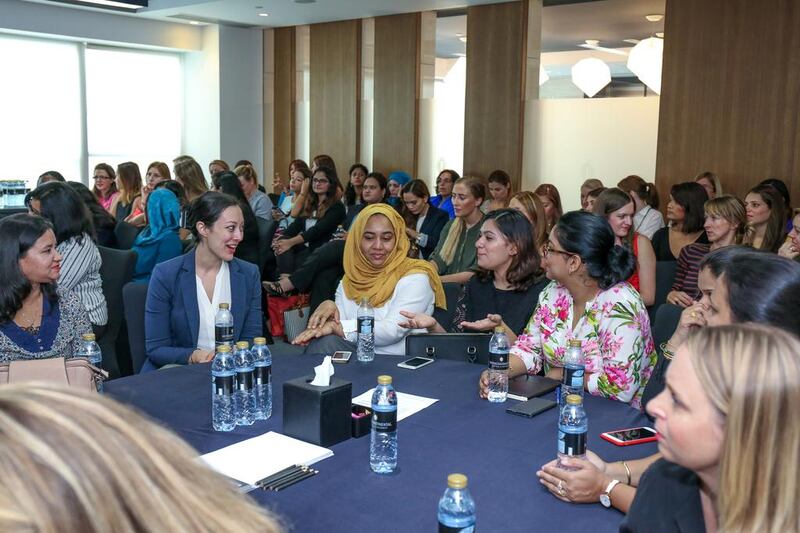For mothers venturing back into the workforce after taking a career break to raise children, a contract stipulating gruelling office hours or “maximum 30-minute lunch breaks” is unlikely to appeal.
Fortunately, according to a panel of four employment experts at a recent Mums@Work workshop aimed at helping women restart their careers, more UAE companies are now offering greater flexibility to attract the right candidates.
Mums@Work, an offshoot of Mackenzie-Jones recruitment consultants, was set up in April by David Mackenzie and Louise Karim to match job-seeking mothers with potential employers, and establish a new community though regular networking events.
When looking for the right employer, mothers should target organisations focused on outcomes rather than office hours, says panellist Jennifer Marles-Malone, head of human resources at Bayer Middle East.
“The defining of the culture of the organisation is really important,” she says. “One of my team members has a young baby who has been sick for five days this week – she messaged me yesterday and she’s had no sleep. It was clear she needed to stay home. That’s fine. She is awesome and for me, the big picture is what she brings to the team overall. If there are days here and there she has to be off, that’s just part of the give and take.”
Another panellist, Mona Ataya, the founder and chief executive of the e-commerce site Mumzworld, juggles her work with raising three sons, 13 year-old twins and a nine-year-old. She says she is never in the office when she has to pick her kids up from school, adding “and I certainly won’t be in the office when my boys have an exam, and I need to help them”.
But she adds that she is “accountable for growing the business” and that is something she cannot compromise on.
“So I manage my time accordingly,” she says. “That’s the kind of company you need to look for, and there are more and more organisations, especially new tech companies, that understand that.”
Ms Ataya says the Mumzworld employee contract stimulates one thing: accountability. “That might be to grow the business by 5 per cent, with five KPIs [key performance indicators]. But how you do it, with whom you do it and when you do it, quite frankly, is irrelevant.”
However, several workshop attendees said the employment contracts they had been offered stipulated set terms. So how fixed are these?
Emma Campbell, the Middle East regional people, diversity and inclusion partner for PwC Middle East, advises mums to focus more on the culture of the organisation.
“A lot of companies still use the draconian clauses in their employment contracts, but what happens in reality might be different,” she says. “The only way you can understand this is by talking to people who actually work there. Ask to meet the staff to find out what it’s really like.”
But Mr Mackenzie warned mums that current market conditions favour the employer rather than the jobseeker. “We run an ad on LinkedIn and get 800 replies,” he admits. “However, of those, 795 are completely irrelevant – wrong country, wrong skill set. I spend most of my time telling candidates, ‘this is what you need to do, tweak your CV’.”
Those keen to re-enter the workforce should consider a sideways step to get back in, he adds. “It’s often better to be in a role than not in a role,” he says. “We move people across industries, so if you were in pharmaceuticals, we might move you into the consumer industry, for example.”
Ms Marles-Malone was a PE teacher for three years before joining the corporate world. “I needed to work out the skills I had that were transferable,” she explains. “As a PE teacher, I organised sporting events and school camps. I had to think about what the core requirements of my role was and break it down to what other skill sets I could transfer.”
This is an approach being adopted by German-Mexican Margareta Harjon. She was an agricultural engineer when she was last in the workforce three years ago. “I’m more than just a mother in the home,” she says. “I tried to find a good opportunity here but my area is very specific, so now I’m trying to find different work.”
Ms Harjon has so far applied to 20 companies and hasn’t yet had any interviews.
Mr Mackenzie recommends talking to a recruitment consultant to get a rounded view of what you can and cannot do. “We match jobs not just on skill set but personality as well,” he says.
To the mums’ advantage, employers are increasingly recruiting on soft skills rather than hard, says Ms Ataya, who herself hires mothers who are “ambitious, creative, authentic and willing to go the extra mile”.
“The hard skills are easy to learn, but the mindset you cannot learn,” she adds. “Jobseekers today need to have a very significant paradigm shift because of the rate of change of everything. When an employee walks into our office, we don’t even look at their tech skills – we look at how innovative they are, their ability to learn and their desire to create a positive impact in this new world.”
business@thenational.ae
Follow The National's Business section on Twitter





